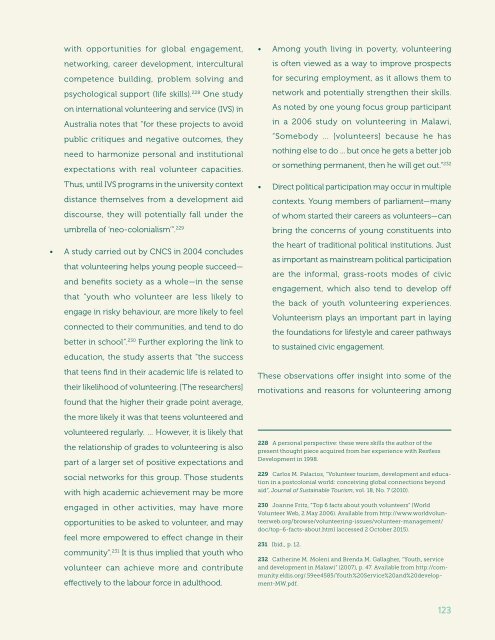YOUTH CIVIC
JieguI2U
JieguI2U
You also want an ePaper? Increase the reach of your titles
YUMPU automatically turns print PDFs into web optimized ePapers that Google loves.
with opportunities for global engagement,<br />
networking, career development, intercultural<br />
competence building, problem solving and<br />
psychological support (life skills). 228 One study<br />
on international volunteering and service (IVS) in<br />
Australia notes that “for these projects to avoid<br />
public critiques and negative outcomes, they<br />
need to harmonize personal and institutional<br />
expectations with real volunteer capacities.<br />
Thus, until IVS programs in the university context<br />
distance themselves from a development aid<br />
discourse, they will potentially fall under the<br />
umbrella of ‘neo-colonialism’”. 229<br />
• A study carried out by CNCS in 2004 concludes<br />
that volunteering helps young people succeed—<br />
and benefits society as a whole—in the sense<br />
that “youth who volunteer are less likely to<br />
engage in risky behaviour, are more likely to feel<br />
connected to their communities, and tend to do<br />
better in school”. 230 Further exploring the link to<br />
education, the study asserts that “the success<br />
that teens find in their academic life is related to<br />
their likelihood of volunteering. [The researchers]<br />
found that the higher their grade point average,<br />
the more likely it was that teens volunteered and<br />
volunteered regularly. … However, it is likely that<br />
the relationship of grades to volunteering is also<br />
part of a larger set of positive expectations and<br />
social networks for this group. Those students<br />
with high academic achievement may be more<br />
engaged in other activities, may have more<br />
opportunities to be asked to volunteer, and may<br />
feel more empowered to effect change in their<br />
community”. 231 It is thus implied that youth who<br />
volunteer can achieve more and contribute<br />
effectively to the labour force in adulthood.<br />
• Among youth living in poverty, volunteering<br />
is often viewed as a way to improve prospects<br />
for securing employment, as it allows them to<br />
network and potentially strengthen their skills.<br />
As noted by one young focus group participant<br />
in a 2006 study on volunteering in Malawi,<br />
“Somebody ... [volunteers] because he has<br />
nothing else to do ... but once he gets a better job<br />
or something permanent, then he will get out.” 232<br />
• Direct political participation may occur in multiple<br />
contexts. Young members of parliament—many<br />
of whom started their careers as volunteers—can<br />
bring the concerns of young constituents into<br />
the heart of traditional political institutions. Just<br />
as important as mainstream political participation<br />
are the informal, grass-roots modes of civic<br />
engagement, which also tend to develop off<br />
the back of youth volunteering experiences.<br />
Volunteerism plays an important part in laying<br />
the foundations for lifestyle and career pathways<br />
to sustained civic engagement.<br />
These observations offer insight into some of the<br />
motivations and reasons for volunteering among<br />
228 A personal perspective: these were skills the author of the<br />
present thought piece acquired from her experience with Restless<br />
Development in 1998.<br />
229 Carlos M. Palacios, “Volunteer tourism, development and education<br />
in a postcolonial world: conceiving global connections beyond<br />
aid”, Journal of Sustainable Tourism, vol. 18, No. 7 (2010).<br />
230 Joanne Fritz, “Top 6 facts about youth volunteers” (World<br />
Volunteer Web, 2 May 2006). Available from http://www.worldvolunteerweb.org/browse/volunteering-issues/volunteer-management/<br />
doc/top-6-facts-about.html (accessed 2 October 2015).<br />
231 Ibid., p. 12.<br />
232 Catherine M. Moleni and Brenda M. Gallagher, “Youth, service<br />
and development in Malawi” (2007), p. 47. Available from http://community.eldis.org/.59ee4585/Youth%20Service%20and%20development-MW.pdf.<br />
123


